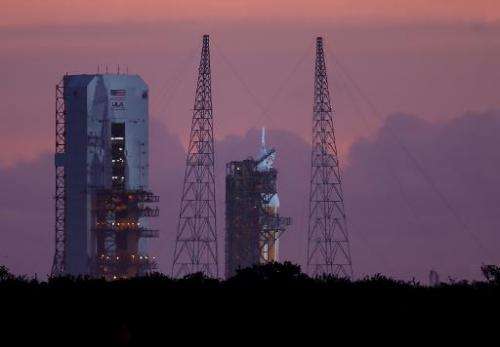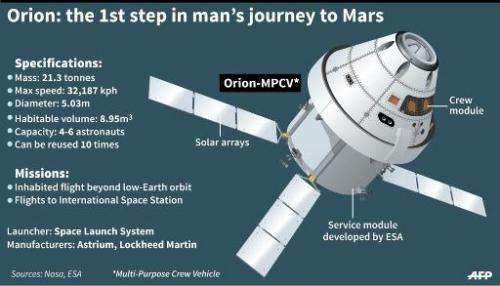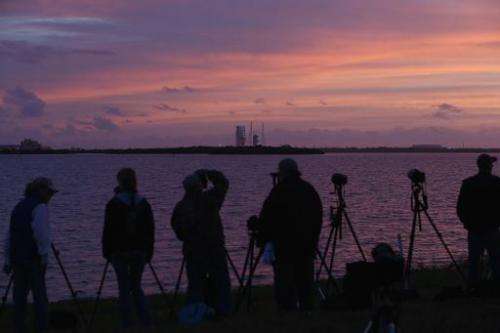NASA's deep space capsule poised for 2nd launch bid (Update)

NASA counted down Friday to its second try at test-launching the deep space Orion capsule on its first journey into orbit, after wind gusts and rocket problems delayed Thursday's attempt.
The unmanned four-hour flight aims to test crucial systems like the heat shield and parachute splashdown on a spacecraft that could one day transport humans to an asteroid, the Moon or Mars.
The window for liftoff aboard a United Launch Alliance Delta IV Heavy rocket from Cape Canaveral, Florida opens at 7:05 am (1205 GMT) and lasts for two hours, 39 minutes.
Early Friday, clouds and rain lingered over the area but conditions could clear up by launch time, according to weather officer Kathy Winters.
"Current weather conditions at Cape Canaveral are observed red because of cumulus clouds and precipitation over the launch site," said the update on NASA's Orion blog at 4:49 am (0949 GMT).
"The good news is that both of those violations are expected to clear in about an hour."
The launch is the first in more than 40 years of a US spacecraft intended to carry humans beyond the Moon. It has reinvigorated a US human exploration program that has been stagnant for more than three years since the last American space shuttle carried a crew of astronauts to the International Space Station.

The 30-year shuttle program ended in 2011, leaving the United States no other option but to pay Russia to carry astronauts on its Soyuz capsules to the orbiting research lab at a cost of $71 million per seat.
Two loops
Friday's launch attempt will propel the Orion capsule into two loops around the Earth.
The first orbit is to be about as high as the International Space Station, which circles at an altitude of about 270 miles (430 kilometers), but the second would soar 15 times higher, to an apogee of 3,600 miles above the Earth.
Then, the spacecraft is supposed to plunge into the waters off San Diego, California to be retrieved by the US Navy.
An analysis of sophisticated sensors on the capsule should let NASA know if the temperature inside remained survivable for a potential crew, even as the spacecraft itself heated to 4,000 degrees Fahrenheit (2,200 Celsius) during its re-entry to Earth's atmosphere at a velocity of 20,000 miles per hour.

Potential future missions for Orion, which can fit four people at a time, include a trip to lasso an asteroid and a journey to Mars by the 2030s.
NASA has already spent $9.1 billion on Orion and the powerful rocket meant to propel it with crew on board, the Space Launch System (SLS).
Another unmanned test flight is slated for 2018. The first Orion test flight with people on board is scheduled for 2021, when total costs are projected to reach $19-22 billion.
United Launch Alliance chief operating officer Dan Collins said he was confident that the sluggish fuel valves that delayed Thursday's launch attempt could be resolved in time for Friday morning's bid.
"We're going to make sure we have a happy rocket, and we're going to send Orion off on a successful mission," Collins told reporters.
About $370 million dollars in equipment is at stake in Friday's launch.
© 2014 AFP





















